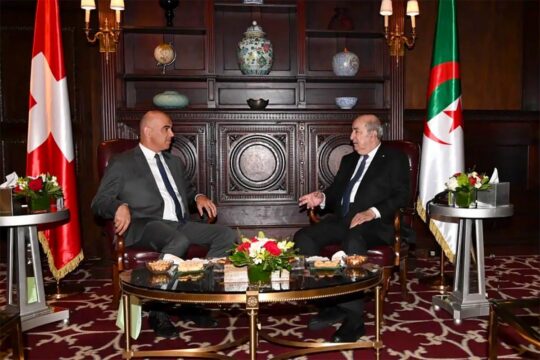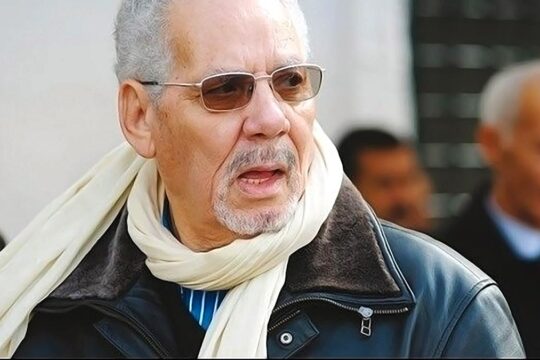The director of a television station is arrested... a court blocks the sale of an opposition media group... parliament passes a law to stop retired army officers commenting on politics.
Despite a new constitution in Algeria guaranteeing freedom of the press, criticising the government is becoming increasingly risky.
Producers at KBC TV, a privately owned channel which airs a talk show that regularly criticises the government, know that only too well.
In late June, a court placed two of the channel's executives in pre-trial detention.
The order came five days after security forces shut down a studio producing talk shows for KBC.
The channel's director, Mehdi Benaissa, and producer Ryad Hartouf were accused of making "false declarations" to obtain filming permits for the programme, Ki Hna Ki Ness (Just Like Everybody Else).
Mounia Nedjai, a culture ministry official who had issued the permits, was also detained.
On Friday evening, around 300 artists and journalists gathered outside the National Theatre in the capital to demand their release.
"I'm not a sycophant or an agitator, I just love my country," they chanted.
International NGOs criticised the arrests.
"Jailing TV executives on the pretext of film-permit irregularities is disproportionate, to say the least," said Sarah Leah Whitson, Middle East and North Africa director of Human Rights Watch.
"The clear intent is to muzzle private media."
- Repeated attacks -
It was not the first time KBC has found itself in the government's crosshairs.
In June, the government won a court case to freeze a bid by billionaire Issad Rebrab to buy KBC and one of Algeria's top newspapers, El Khabar (The News).
The $45-million (40-million-euro) sale is expected to be definitively blocked by mid-July.
Rebrab is Algeria's richest entrepreneur but has a tense relationship with the authorities.
Like KBC and El Khabar, Rebrab's French-language daily Liberte strongly opposed Abdelaziz Bouteflika's decision to stand for a fourth term as president in 2014, an election he won.
The ailing 79-year-old suffered a stroke in 2013 that has impeded his mobility and speech. Speculation has been growing in the Algerian press about who will succeed him.
Opposition leaders have spoken of a power vacuum.
Former prime minister Ali Benflis, who stood against Bouteflika in 2014, condemned the latest arrests and denounced the government for "repeated attacks on independent media".
He said the government was "a regime that doesn't hold back from any excess" and "persists in placing itself above the constitution and the law".
Amnesty International said the charges against the KBC TV executives and Nedjai were "politically motivated".
It called on the Algerian authorities to "respect, protect and promote freedom of the media following the growing restrictions against independent outlets and journalists in the past few months".
The government cited a law preventing a single legal entity owning more than one Algerian daily newspaper.
Media watchdog Reporters Without Borders (RSF) called the court ruling "extremely worrying".
It said it was "outraged" at the "new attack on the independence of KBC", and demanded the trio's release.
Algeria's constitution, adopted in February, explicitly guarantees freedoms of assembly and the press, dictating that "press offences may not be punished by a custodial sentence".
Communications Minister Hamid Grine has denied that Algeria jails journalists who offend the government.
"A journalist would never go to prison" for a press offence, he said in May.
- Draconian drift -
Mehdi Benaissa's father Slimane, a well-known dramatist, wrote an open letter to Bouteflika on Sunday.
"I am a worried and angry father. Worried because my son is in prison, and angry because I don't know exactly why," he wrote in the letter, published by the opposition newspaper Le Soir d'Algerie.
Louisa Hanoune, a Trotskyist member of parliament and former presidential candidate, condemned the government's "totalitarian intentions" and said it was promoting "draconian laws contrary to the constitution".
Parliament, which is dominated by Bouteflika supporters, last week passed a law limiting the right of retired senior military officers to comment on politics.
The new law demands that former soldiers abstain from "every act, remark or behaviour likely to harm the institutions of the state and public authorities".
Some retired military figures regularly comment on political issues. One retired general, Hocine Benhadid, has been in custody for more than a year after criticising the government.
Ahead of last week's vote, former defence minister Khaled Nezzar, the country's strongman during its civil war in the 1990s, urged parliamentarians to reject the text.
He said it represented a "grave draconian drift".


